#汉语
Text
very silly post but i wanted to unwind a bit so i thought i would rate chinese endearments!
宝贝:classic, casual endearment. i call my cats this, has a similar feel to "babe" for me. 4/5, one point deducted because it's pretty basic.
宝宝:like a cutesier version of 宝贝, i would never call a romantic partner this, but it's great for pets and children. 3.5/5, points deducted because it can sound kind of trite or cringey.
亲爱的:much more formal, has a similar feel to "beloved" or "darling" to me. arguably my favourite endearment because it literally means "[one] who is an intimate love". 5/5 if an s/o called me this i would melt.
老[姓名]:this can come off as overtly lovey-dovey at times but it's also really common among married or long-term couples. it doesn't really have an english comparison but personally i think it's very sweet. it can also be used teasingly which i enjoy. 4.5/5 with 0.5 points taken off because it can sound kind of old-fashioned.
老婆/老公:an even more married version of the above; this feels much more teasing to me, though. 4/5 with one point deducted because unfortunately 老公 can also mean eunuch (oops).
(老)狐狸(精):i've only ever heard this in dramas as a reference to a man, but it's meant to call someone sly or cunning. can be admonishing, but can also be an affectionate reproval. can also be used for women, but then to me it comes off as a bit more judgemental, so 4/5.
小哥:technically a descriptor of a young man, but i'm personally attached to this as a term of endearment, and if someone called me this i would be smitten. i think it has been gaining some popularity among chinese sapphics, especially butch lesbians/T's? but unfortunately i don't.............really use social media so i can't confirm this.
姐姐/哥哥:these are technically originally terms for older brothers/sisters, but they're also used for people of the same generation who are older than you, and can be used in a flirty way. 4/5 only because non-chinese english speakers can get kind of weird about them.
阿-/小-:personally i prefer the 阿- suffix over 小- because 小- sounds like you're talking to a child to me, but i'm aware this is very regional. not overly romantic, but can be very sweet, so i'm giving it a 3.5/5.
those are all the ones i can think of off the top of my head, but if you have any others you can think of, let me know!
759 notes
·
View notes
Text
Speak DECENT CHINESE in 4 months - 8 easy tips
______
1. Have someone to guide you to get good pronunciation habits. It is almost impossible to re-learn bad habits later so make sure you get your pronunciation right from the beginning. I mean the pronunciation of the sounds, not the tones. Tones take more time to get used to and you can't rush it - but try the best you can. Some tutors don't bother too much about the pronunciation so make sure you find someone who is strict about that, you will be grateful later. Also get confident in pinyin, you will need it.
2. Understand the composition of the sentences. The word order is super easy and it stays the same all the time (the question and informative sentences have the same word order). I have a formula for the word order but I won't reveal it here, it is one of the secrets I keep for my students and people who use my materials.
3. Understand that there are no tenses in the sense we think about them in English and other languages. Learn to express future, potential future, finished action, change of state, experience in the past and circumstances of the event. See the difference between action verbs and verbs of state.
4. Learn to use modal verbs and conjuctions.
5. Build usable vocabulary based on the fact that everything in Chinese is interconnected.
6. Understand 就, 才,的 and 得
7. Don't learn grammar rules and words separately. Learn functional practical sentences that will serve you as examples of the grammar structures (then you just need to change the words in these sentences).
8. Develop your listening skills - that is very important. For that there are Youtube channels and podcasts on Spotify (and in my materials the audio part also plays an important role). You can listen to Chinese radio stations just to get the feeling of the language.
______
After 3-4 months you should feel pretty confident in normal conversations if you study regularly under competent guidance.
______
R-evolutionary learning materials and resources: https://linktr.ee/chineseffect
MAGIC PLAYBOOK for beginners
#learn chinese#learn mandarin#chinese langblr#mandarin langblr#edublr#mandarin#chinese#mandarin edublr#langblr#chinese vocabulary#mandarin chinese#chinese edublr#learning mandarin#learning chinese#study chinese#mandarin vocabulary#study mandarin#汉语#chinese studyblr#beginners chinese#chinese for beginners#learning tips#chinese tips#mandarin tips
241 notes
·
View notes
Text
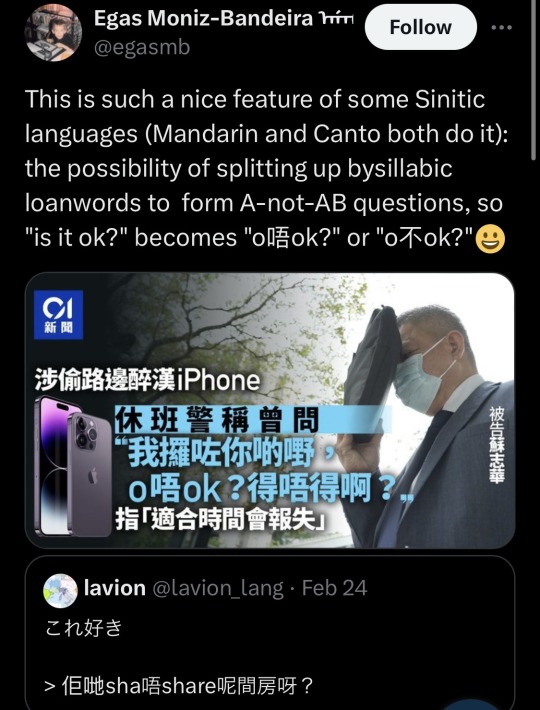
I saw this on Twitter and then asked some Chinese friends about it because I thought it was super cool. Because yeah, apparently two-syllable (or two-part? Like below with “share”) loanwords can be reanalyzed as separable morphemes.
One friend also said it sounded outdated lol like from when she was little, maybe 15 years ago or so. But still!
33 notes
·
View notes
Text
Class shenanigans #2
We went a bit off-topic in class talking about how so many characters still look like their original pictographs, and someone mentioned"噩梦"(èmèng) meaning nightmare.
I mean, just look at this first character.
噩
Enough said.
Maybe its just me lacking sleep and being over-caffeinated (the coffee drinks here are no joke, I can't drink them after 10 am or else I have trouble falling asleep), but this character looks so ominous, like a scary creature with 4 eyes just staring blankly into my soul.
#mandarin langblr#chinese langblr#chinese#studyblr#college life#student life#the new star of my future nightmares#college#study blog#travel blog#study in china#slavic roots western mind#噩#汉语#中文#tumblr 中文#mandarin
55 notes
·
View notes
Text
Online Mandarin Tests!♡
hello sweeties, what's up?
i found a site with chinese tests to improve your study. check the list:
Pinyin: 1 | 2 | 3 | 4 | 5 | 6 | 7
Numbers: 1 | 2 | 3 | 4
Animals: 1 | 2 | 3
Body: 1 | 2
Family: 1 | 2 | 3 | 4
On and Under: 1 | 2
Colours: 1 | 2
Clothes: 1 | 2 | 3
if you want more, just search here !
hope it can be useful for your study and any questions you have don't hesitate to talk with me. 加油!♡

#chinese#learn chinese#learn mandarin#china#chinese girl#yuqi#gidle#langblr#study chinese#basic chinese#soft chinese#softchinese#orientalismx#hanyu#汉语#普通话#中国#学习汉语#hsk1#hsk2#chinese vocab#chinese grammar#chinese text#chinese quizz#chinese test
334 notes
·
View notes
Text

today's vocabulary : 洗衣粉 [xǐ yī fěn]
#language#studyblr#langblr#chinese langblr#chinese studyblr#mandarin#learn mandarin#中文#汉语#chinese vocabulary#study chinese#chinese characters#mandarin chinese#studying chinese#china
24 notes
·
View notes
Photo

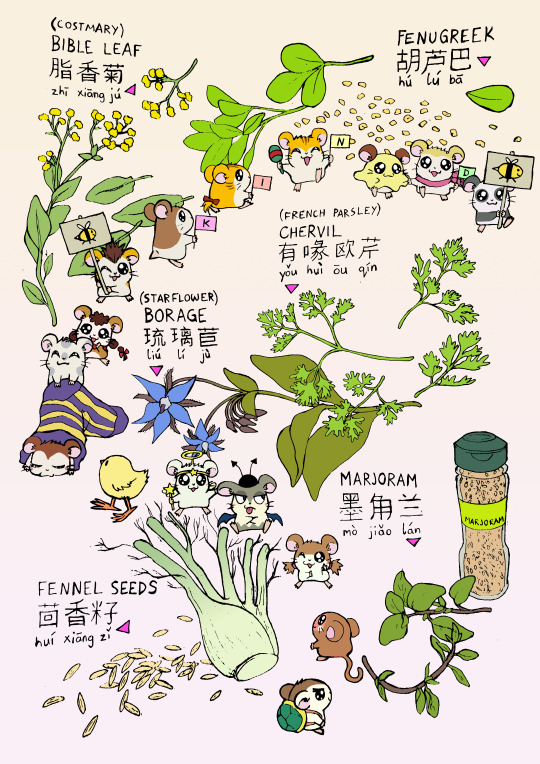

Health is wealth!
Eat plants 🍉🥔🥦
Plant trees🌱🌲🌳
Love animals🐹🐥🐑
Heal the planet💚🌍💚
Herbs and Spices
Part 1
Part 2
Part 3
Part 4 (you are here)
442 notes
·
View notes
Text

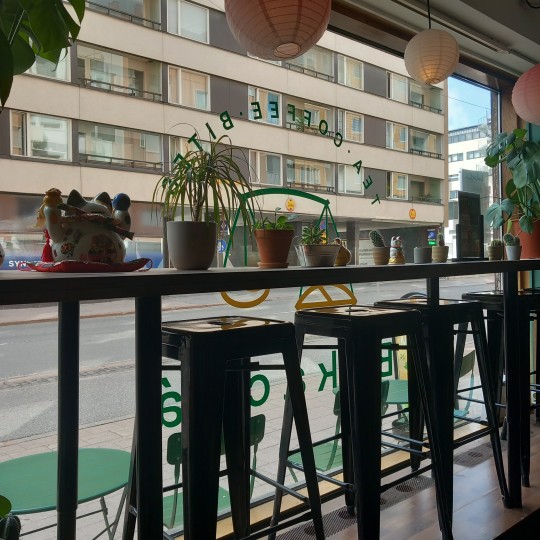


aug 23, 2023
artist: yu xiaodong
#realised my blog was not old enough yet to show up in tags oops#vietnamese langblr#langblr#studyspo#korean langblr#langvillage#한국어 배우기#한국어 공부#日本語#にほんご#汉语#学习汉语#tiếng việt#học tiếng việt#studyblr#studygram#study aesthetic#study motivation#polyglot#duolingo#bookblr#bookstagram#bookish#dark academia
38 notes
·
View notes
Text
learning simplified chinese after learning japanese is fun because i find traditional chinese characters easier than simplified ones even though they're much more complicated just because i already know them
15 notes
·
View notes
Text
Yesterday I learnt about one of the handiest resources for learning Chinese ever:
Wiktionary category pages that list all nouns that use a given measure word!
First you find the measure word you want to look up, for example 本 . In the Chinese section find the definitions, and among the definitions find the one that mentions it being a classifier (here number 8). There is a small link to "all nouns using this classifier" which in this case is
Like how many times have I said that there needs to exist a list of all words using a given measure word? Most of the time you google it you get like lists of a lot of different measure words with one or two examples each, and that is the opposite of what I have always wanted.
And of course it being Wiktionary is, like at the same time amazing and obvious. Of course crowdsourcing this is perfect, people really are amazing and want to create good resources like this, the entire Wikimedia project is proof of this.
191 notes
·
View notes
Text
i haven't seen anyone talk about it before, but there's a site called 21st Century Chinese Poetry that has a massive collection of contemporary chinese poetry, including english translations thereof, for anyone who, like me, is interested in poetry but may feel a bit intimidated by the more literary nature of classical poetry. currently, they have poetry from between 2000-2021, and i, personally, have rather enjoyed poking around the site.
#chinese langblr#mandarin langblr#chinese#chinese language#mandarin#mandarin chinese#langblr#language learning#langblr resources#resources#汉语#indigo ink
715 notes
·
View notes
Text
因为我学习汉语,我就在这儿发我的日记。我还学习呢,所以我知道可能日记里有些错误。请热情地帮助我把错误改善更好。你也可以给我发一条短信所以我们练习中文或者我们可以就随便谈谈。好啦,我去睡觉呢。晚安~
6 notes
·
View notes
Text

山很高,海很深 /shān hěn gāo, hǎi hěn shēn/
MOUNTAINS ARE HIGH, SEAS ARE DEEP
________
Beginner?
MAGIC PLAYBOOKS
Intermediate?
WORDPLAYS
FREE 12 DAY MANDARIN CHALLENGE
#chinese#mandarin#learn chinese#learn mandarin#chinese langblr#mandarin langblr#edublr#langblr#mandarin edublr#chinese vocabulary#mandarin chinese#chinese edublr#study chinese#learning chinese#learning mandarin#mandarin vocabulary#study mandarin#中文#汉语#chinese studyblr#mountain#mountains#sea#scenery#nature#daoism#dao
21 notes
·
View notes
Text
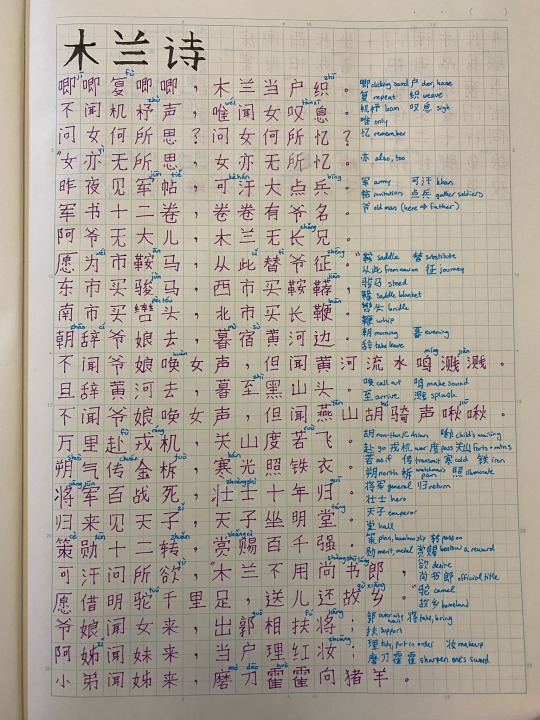

The Ballad of Mulan: 木兰诗 mù lán shī
I was curious about what the original story was like, so I looked up (a version of) the original text. It was really interesting and eye-opening because (unsurprisingly?) it's nothing like the Disney movie(s). The only real similarity is the premise: a young woman with no older brother takes her elderly father's place in the war draft. Apart from that, about every other detail is different:
Mulan has siblings: an older sister and a younger brother.
The ruler of this kingdom is referred to as the Khan/Khagan (可汗) and as the Son of Heaven (天子), titles used together for the emperors of the Northern Wei Dynasty (北魏 386–535 CE).
Mulan is never discovered to be a woman during her time in the army, spending 12 years there.
The enemy is never specified explicitly, though historically this may have been the Rouran (柔然) in present-day Inner Mongolia (内蒙古). Places that Mulan passes include the Yellow River (黄河), the Black Mountain (黑山, thought to be southeast of Huhhot 呼和浩特, Inner Mongolia), and the Yan Mountain (燕山, referring to either the 阴山 Yīn mountains of Inner Mongolia or the 燕然山 Yānrán mountains of Mongolia 蒙古).
The description of her journey is much longer and more colorful than anything about the war itself, providing imagery and parallel structure that differs from the rest of the poem.
On the soldiers' return, the emperor offers Mulan a government position (尚书郎), which she turns down, asking only for a 明驼 to return her home across the 万里 that separated her from her family. I wasn't sure if this "camel" was to be taken literally; translations I found differed on whether this was a camel, a horse, or some magical version of these which traveled at incredible speed.
The soldiers only discover that Mulan is a woman when she returns home, changing back into her old clothing (旧时裳), pulling her hair back into a feminine style, and applying makeup. I found it curious just how quickly she readjusted to her old life.
The last lines of the poem were also really beautiful and spoke to me in a queer way. It says that when you see a pair of rabbits, male and female, running together, side by side, how can you tell them apart?
雄兔脚扑朔,雌兔眼迷离,双兔傍地走,安能辨我是雄雌?
These lines include a chengyu, 扑朔迷离, meaning "complicated, confusing," which originally comes from this passage, referring to the difficulty in telling apart the male and female rabbits. "The male's foot is twitching, the female's eyes are squinted, blurry," but these small differences aren't noticeable from afar or when the rabbits are in motion. Though you might eventually be able to pick out some small details regarding the sexes of the rabbits, in the end it doesn't really matter. To the hunter, for instance, these are both simply targets; their sex is inconsequential.
For Mulan, in her role in the army, it didn't matter that she wasn't a man; she completed her tasks regardless. (And not only did she complete them, she earned recognition from the emperor for her work.)
Transphobes online may waste hours picking apart the details of people's bodies that they deem gender variant, but in the end, in many cases, people simply don't care whether the rabbit has twitchy feet or squinted eyes or whatever else. A rabbit is a rabbit, and our genders are rarely, if ever, consequential enough to the task at hand to merit such scrutiny.
安能辩我是雄雌?你到底为什么要知道?
108 notes
·
View notes
Text
O- Verbs in Chinese
Here are some of the most commonly used O-verbs in Chinese!
Obey - 服从 (Fúcóng)
Object - 反对 (Fǎnduì)
Observe - 观察 (Guānchá)
Obtain - 获得 (Huòdé)
Occur - 发生 (Fāshēng)
Offer - 提供 (Tígōng)
Open - 打开 (Dǎkāi)
Optimize - 优化 (Yōuhuà)
Order - 命令 (Mìnglìng)
Order (at a restaurant) 点 (Diǎn)
Organize - 组织 (Zǔzhī)
Originate - 起源 (Qǐyuán)
Overcome - 克服 (Kèfú)
Overflow - 溢出 (Yìchū)
Overhaul - 检修 (Jiǎnxiū)
Overheat - 过热 (Guòrè)
Overlook - 忽视 (Hūshì)
Oversee - 监督 (Jiāndū)
Overthrow - 推翻 (Tuīfān)
Owe - 欠 (Qiàn)
Own - 拥有 (Yōngyǒu)
Outline - 概述 (Gàishù)
#slavic roots western mind#studyblr#mandarin langblr#chinese langblr#learn chinese#chinese#student life#college life#student#study blog#aesthetic#college#travel blog#study motivation#mandarin#chinese verbs#verb#verbs#vocabulary#vocab#language#linguistics#vocabulary list#汉语#langblr#中文#resources#学汉语#chinese language#chinese vocabulary
10 notes
·
View notes
Text
curious if anyone learning chinese has used Clozemaster - and if so, how are you finding it?
as soon as i saw the chatgpt generated explainations, alarm bells went off! I don't know if I'm letting my chatgpt/AI sceptic mindset cloud my judgement but not super convinced by the accuracy of it...
like 睡觉??!? somehow I don't think we're talking about 睡觉 here... 😭
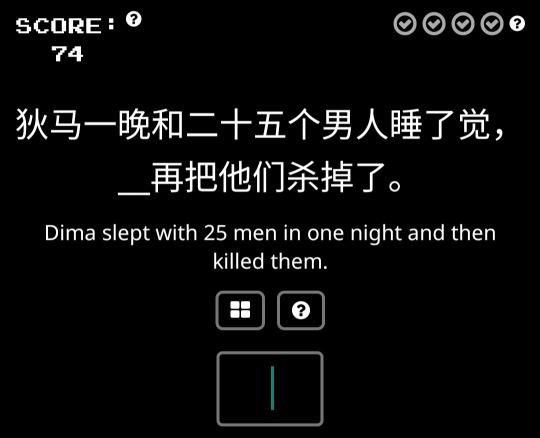
#clozemaster beating duolingo in the unhinged sentence category#中文#language learning#汉语#chinese langblr#mandarinmoon
6 notes
·
View notes